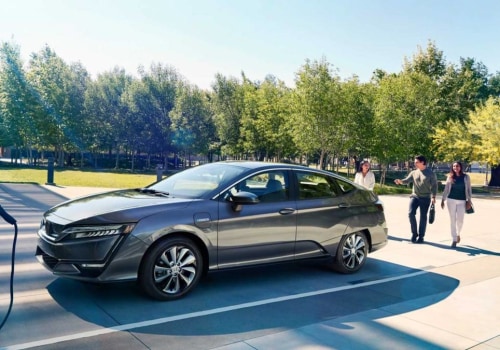Electric vehicles are increasingly becoming a popular option for drivers looking for an efficient and sustainable alternative to gasoline-powered cars. They offer a wide range of benefits, from the environmental impact of reducing emissions to the cost savings associated with lower fuel and maintenance costs. In this article, we'll explore the various benefits of electric vehicles and why they may be the right choice for your next car. Electric vehicles are powered by an electric motor rather than an internal combustion engine, meaning that they don't rely on burning gasoline or diesel for fuel. This means that they produce zero emissions while driving, making them much more environmentally friendly than traditional gas-powered cars.
Furthermore, electric vehicles can be charged using renewable energy sources such as solar or wind power, making them even more green. In addition to their environmental benefits, electric vehicles also offer drivers significant cost savings. Electric vehicles require less maintenance than traditional cars, since there is no need to change the oil or replace spark plugs and other components. Additionally, electric vehicles are much cheaper to operate over time, as they cost much less per mile than traditional gasoline-powered cars. Finally, electric vehicles offer a smooth and quiet ride that many drivers prefer over the loud and bumpy ride of gasoline-powered cars. With all these advantages, it's easy to see why electric vehicles are becoming an increasingly popular choice for drivers around the world. Electric vehicles (EVs) are becoming increasingly popular due to their numerous advantages, including environmental impact, cost savings, and performance.
In this article, we'll discuss the various benefits of electric vehicles and why they're a great option for many people. One of the biggest advantages of EVs is their environmental benefit. EVs generate zero emissions, meaning they have no direct impact on air quality or greenhouse gas emissions. This can help reduce the risk of climate change and improve air quality.
Additionally, the majority of electricity generated in the US is from non-polluting sources, such as solar and wind power, so using an EV has a much lower carbon footprint than using a gasoline vehicle. In addition to environmental benefits, electric vehicles can also save you money in the long run. EVs generally have lower running costs than gasoline vehicles as they don't require regular maintenance like oil changes or tune-ups. Additionally, many governments offer incentives for EV purchases, such as tax credits or reduced registration fees, which can make the cost of buying an EV much more affordable.
Performance is another major advantage of electric vehicles. EVs have much higher torque than gasoline vehicles, which means they accelerate faster and provide a smoother ride. Additionally, EVs are much quieter than gasoline vehicles due to their lack of engine noise. This can make driving an EV more enjoyable and peaceful experience.
Lastly, electric vehicles offer a great deal of convenience. Many EVs can be charged at home using a standard wall outlet, making it easy to keep your vehicle charged up without having to visit a public charging station. Additionally, there are now many public charging stations available in most major cities, making it easy to find a place to charge up when you're on the go. As you can see, electric vehicles offer many benefits over gasoline vehicles.
From their environmental impact to their cost savings and performance advantages, EVs are becoming an increasingly popular choice for many drivers. With their improved convenience and availability of charging stations, EVs are becoming even easier to use and maintain.
Performance of Electric Vehicles
Electric vehicles (EVs) offer improved performance in a variety of ways. One of the most noticeable differences is the improved acceleration and torque of an electric motor. Electric motors can provide instant torque, which gives EVs a better ability to accelerate from a standstill.Additionally, electric motors don’t have transmission or gears, so they don’t suffer from the same power losses that occur in gasoline engines. This means that EVs can provide more consistent performance at higher speeds than other types of vehicles. In addition to improved acceleration and torque, electric vehicles are also much quieter than traditional gasoline-powered cars. Electric motors produce very little noise compared to gasoline engines, so you can enjoy a much smoother and quieter ride. This can be especially beneficial for those who live in densely populated areas, where noise pollution is a major issue.
Environmental Benefits of Electric Vehicles
Electric vehicles (EVs) are becoming increasingly popular due to their numerous advantages, including their positive environmental impact.EVs produce zero tailpipe emissions and significantly reduce greenhouse gas emissions and air pollution compared to traditional gasoline-powered vehicles. This makes electric vehicles a great option for anyone who wants to help protect the environment. By switching to an electric vehicle, you can help reduce the amount of carbon dioxide, carbon monoxide, and other pollutants released into the atmosphere. According to the US Environmental Protection Agency (EPA), electric vehicles reduce greenhouse gas emissions by 50-70% compared to traditional gasoline-powered vehicles.
This is because electricity is a cleaner source of energy than gasoline. In addition to reducing greenhouse gas emissions, electric vehicles also help reduce air pollution. EV engines produce no tailpipe emissions such as nitrogen oxides, particulate matter, and volatile organic compounds (VOCs), all of which contribute to poor air quality. As a result, electric vehicles are a great way to help reduce air pollution in urban areas.
Another benefit of electric vehicles is that they produce less noise pollution than traditional gasoline-powered vehicles. EVs are powered by electric motors, which are much quieter than internal combustion engines. This makes electric vehicles ideal for city streets where noise pollution can be a major issue. In summary, electric vehicles offer many environmental benefits, including reduced greenhouse gas emissions, improved air quality, and reduced noise pollution.
Switching to an electric vehicle is an easy way to help protect the environment and make our cities healthier places to live.
Convenience of Electric Vehicles
Electric vehicles (EVs) offer many advantages in terms of convenience. With the ability to charge at home or at public charging stations, electric vehicles offer a convenient and efficient way to get around. Charging at home is the most convenient way to power up an electric vehicle.With a home charging station, drivers can charge up their vehicle overnight without having to find a public charging station. Additionally, some electric utilities offer reduced rates for charging during off-peak hours. This further reduces the cost of ownership for electric vehicles. Public charging stations are also becoming increasingly common, making it easier for drivers to top up their batteries while on the go. Most public charging stations are located in parking lots, shopping malls, and even workplace parking lots.
Many of these stations are free or offer discounted rates, making them even more attractive for electric vehicle owners. Finally, many cities are installing fast-charging stations that can provide an 80% charge in as little as 20 minutes. These fast-charging stations offer a great option for those who need to quickly top up their battery while out and about.
Cost Savings of Electric Vehicles
Electric vehicles (EVs) offer an array of cost savings when compared to traditional gasoline-powered cars.This is due to their lower running costs, such as lower fuel costs, maintenance, and insurance. EVs also have fewer moving parts than gasoline-powered vehicles, meaning that regular servicing and repairs are less frequent and costly. In addition to these cost savings, there are also government incentives available for electric vehicle owners. Many countries provide tax credits or rebates for purchasing an electric vehicle, making them more affordable for many people. Some countries also offer other incentives, such as free or reduced parking fees, as well as access to special charging stations. Other cost savings that come with owning an electric vehicle include reduced emissions, resulting in lower emissions fees.
Additionally, electric vehicles have a lower total cost of ownership over the long run, due to their longer life span and lower maintenance costs. Finally, electric cars can be cheaper to insure than their gasoline-powered counterparts. Electric vehicles (EVs) offer a range of benefits that make them an attractive option for many people. From environmental impact to cost savings, performance, and convenience, EVs are an excellent choice for those looking to reduce their carbon footprint, save money, and enjoy a powerful, reliable vehicle. EVs are an affordable and efficient way to travel, with the potential to save you money in the long run. They also require less maintenance than traditional gas-powered vehicles, making them a more convenient option for many drivers.
And thanks to advancements in technology and battery life, electric vehicles are becoming increasingly powerful and reliable. Overall, electric vehicles are an excellent choice for those who want to reduce their environmental impact, save money, and enjoy a reliable and powerful vehicle. With so many advantages, it's no wonder why EVs are becoming increasingly popular.











Leave Message